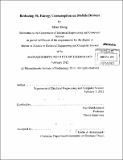Reducing 3G energy consumption on mobile devices
Author(s)
Deng, Shuo
DownloadFull printable version (2.624Mb)
Alternative title
Reducing 3rd generation energy consumption on mobile devices
Other Contributors
Massachusetts Institute of Technology. Dept. of Electrical Engineering and Computer Science.
Advisor
Hari Balakrishnan.
Terms of use
Metadata
Show full item recordAbstract
The 3G wireless interface is a significant contributor to battery drain on mobile devices. This paper describes the design, implementation, and experimental evaluation of methods to reduce the energy consumption of the 3G radio interface. The idea is to put the radio in its "Low-power idle" state when no application is likely to need the network for some duration of time in the future. We present two techniques, one to determine when to change the radio's state from "Active" to "Low-power idle", and the other to change the radio's state from "Low-power idle" to "Active". The technique for switching to Low-power idle mode is well-suited for the emerging "fast dormancy" [3, 4] primitive that will soon be common on smartphones. We demonstrate using an implementation and a trace-driven evaluation based on the measurement and trace collected from HTC GI and Samsung Nexus S phones over various combinations of seven different background applications that our methods reduce the energy consumption of the 3G interface by 36% on average compared to the currently deployed scheme on the T-mobile network. In addition, if applications are able to tolerate a delay of a few seconds when they initiate a session, our methods reduce energy consumption by 52% on average, with a mean increase in delay of 6.46 seconds.
Description
Thesis (S.M.)--Massachusetts Institute of Technology, Dept. of Electrical Engineering and Computer Science, 2012. Cataloged from PDF version of thesis. Includes bibliographical references (p. 63-64).
Date issued
2012Department
Massachusetts Institute of Technology. Department of Electrical Engineering and Computer SciencePublisher
Massachusetts Institute of Technology
Keywords
Electrical Engineering and Computer Science.